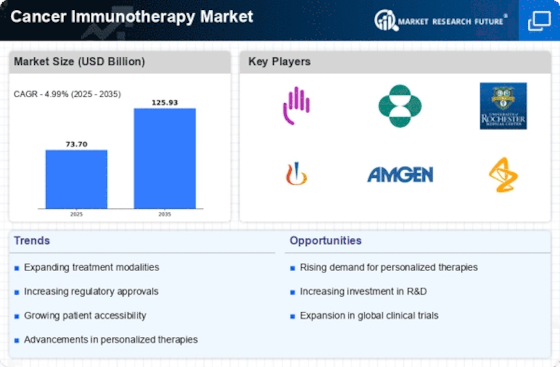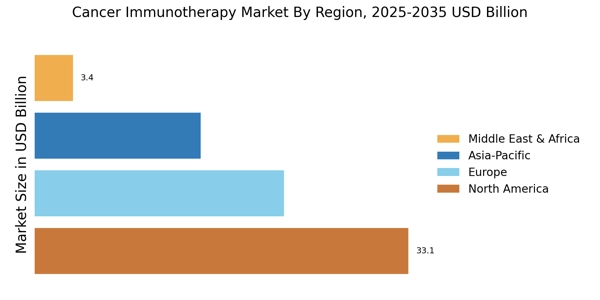Advancements in Technology
Technological innovations play a crucial role in shaping the Cancer Immunotherapy Market. The emergence of advanced techniques such as CRISPR gene editing, next-generation sequencing, and artificial intelligence in drug discovery has revolutionized the development of immunotherapeutic agents. These technologies enable researchers to identify novel targets and develop personalized therapies tailored to individual patients. As a result, the Cancer Immunotherapy Market is witnessing a surge in the introduction of new products and treatment modalities, enhancing the overall efficacy of cancer treatments. The integration of technology into immunotherapy development is expected to drive market growth and expand treatment options for patients.
Growing Prevalence of Cancer
The increasing incidence of cancer worldwide is a primary driver for the Cancer Immunotherapy Market. According to recent statistics, cancer cases are projected to rise significantly, with estimates suggesting that by 2040, there could be over 27 million new cancer cases annually. This alarming trend necessitates the development of innovative treatment options, including immunotherapy, which harnesses the body's immune system to combat cancer. As healthcare systems strive to address this growing burden, the Cancer Immunotherapy Market is likely to experience substantial growth, driven by the demand for effective therapies that can improve patient outcomes and survival rates.
Rising Awareness and Education
The increasing awareness and education surrounding cancer immunotherapy are pivotal drivers for the Cancer Immunotherapy Market. As healthcare professionals and patients become more informed about the benefits and potential of immunotherapy, the demand for these treatments is expected to rise. Educational initiatives, conferences, and patient advocacy groups play a vital role in disseminating information about immunotherapy options. This heightened awareness can lead to more patients seeking immunotherapy as a viable treatment option, thereby expanding the market. The Cancer Immunotherapy Market is likely to benefit from this trend, as more individuals become aware of the advancements in cancer treatment.
Regulatory Support and Approvals
Regulatory bodies are increasingly supportive of cancer immunotherapy, which significantly impacts the Cancer Immunotherapy Market. Recent years have seen a rise in the number of approvals for immunotherapeutic agents, with agencies like the FDA and EMA expediting the review process for promising therapies. This regulatory environment fosters innovation and encourages pharmaceutical companies to invest in research and development of new immunotherapies. The approval of novel agents not only enhances treatment options for patients but also stimulates market growth, as more therapies become available to address various cancer types. The supportive regulatory landscape is likely to continue driving the Cancer Immunotherapy Market forward.
Investment in Healthcare Infrastructure
Investment in healthcare infrastructure is a significant driver for the Cancer Immunotherapy Market. Governments and private entities are increasingly allocating resources to enhance healthcare systems, particularly in oncology. This investment includes the establishment of specialized cancer treatment centers, research facilities, and access to cutting-edge technologies. As healthcare infrastructure improves, the availability and accessibility of cancer immunotherapy treatments are expected to increase. Enhanced infrastructure not only supports the delivery of immunotherapy but also facilitates clinical trials and research, further propelling the Cancer Immunotherapy Market. The ongoing investment in healthcare is likely to create a favorable environment for the growth of immunotherapy.

















